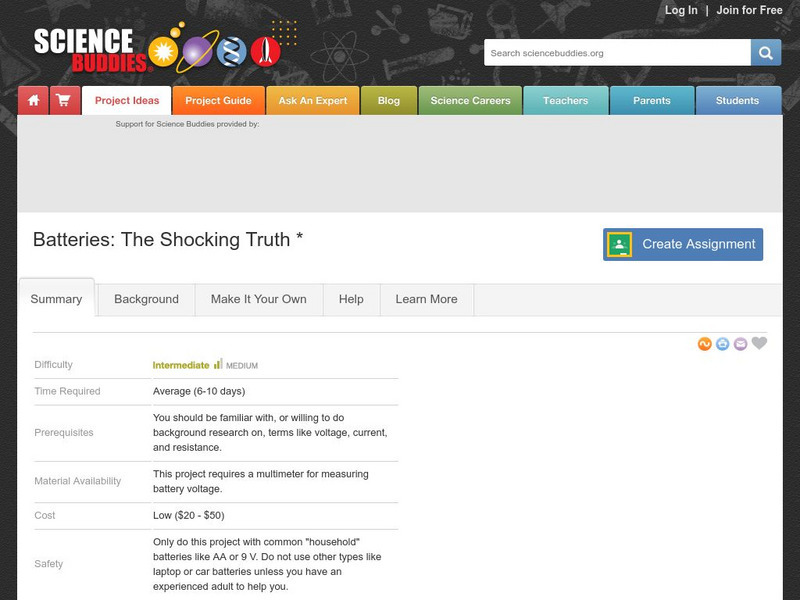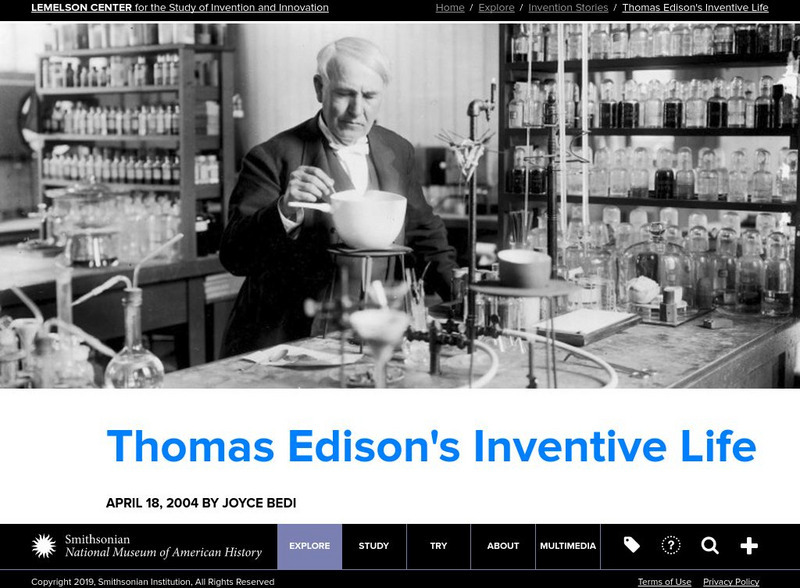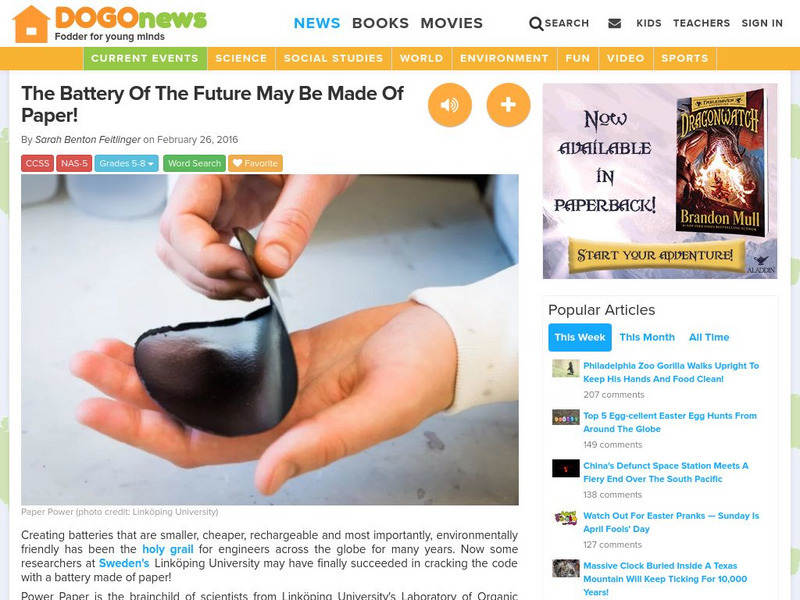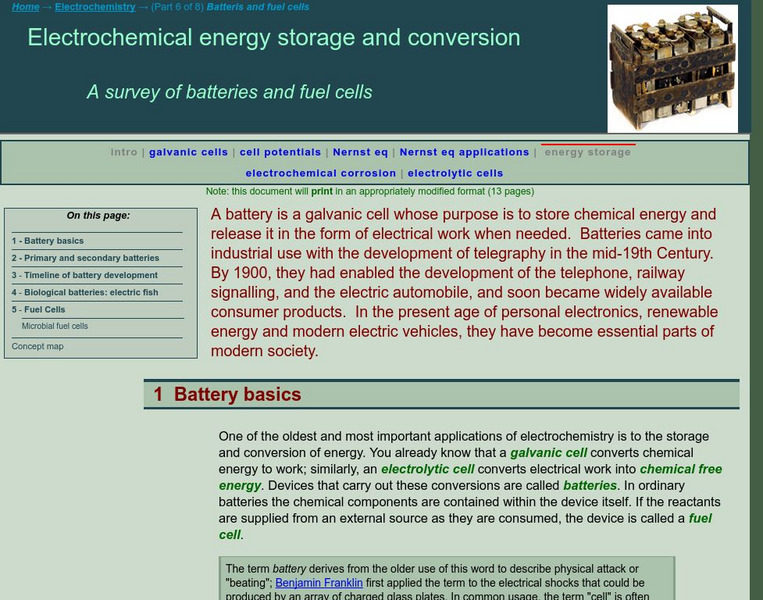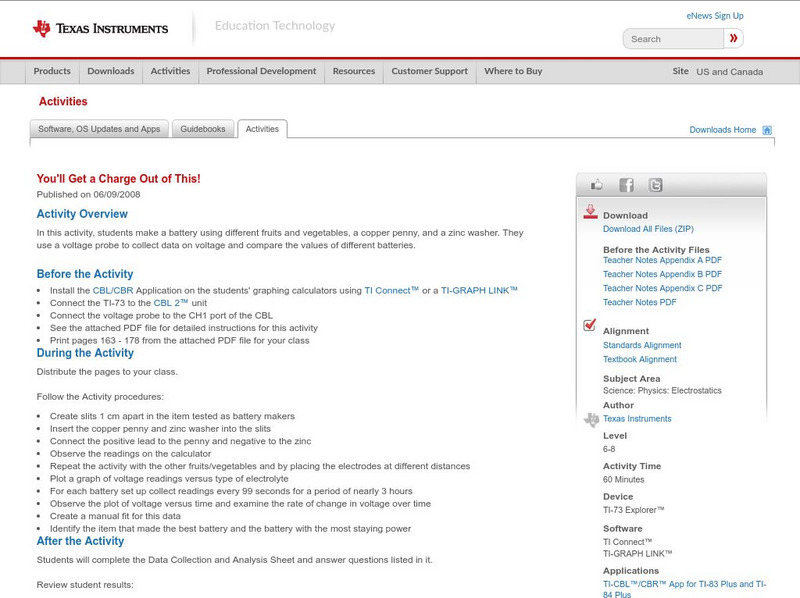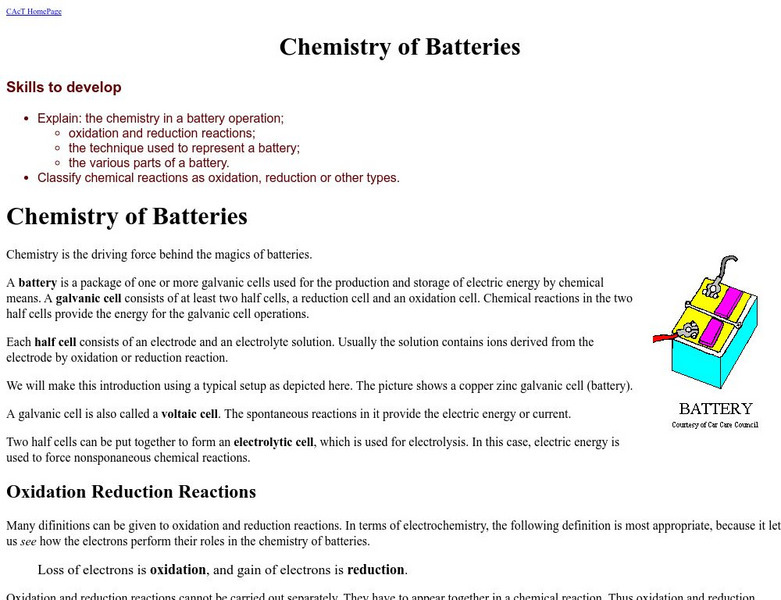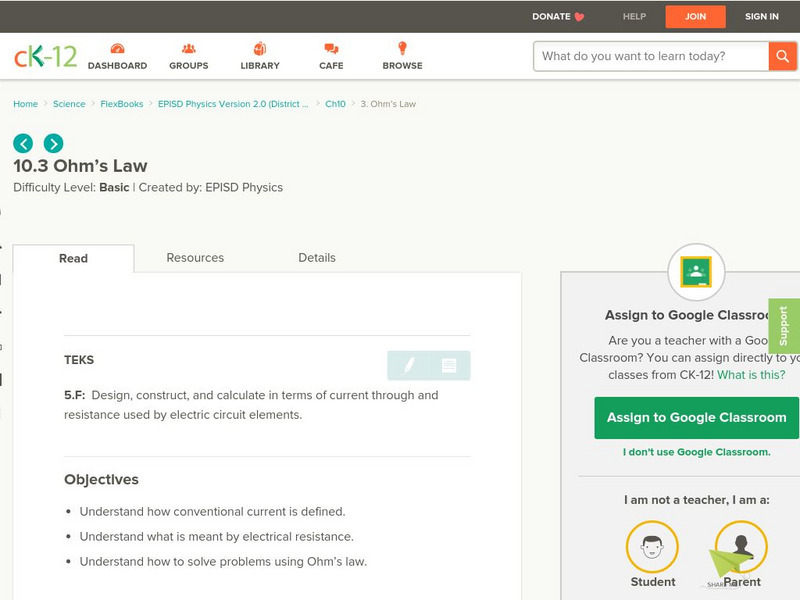TED Talks
Ted: Ted Ed: Electric Vocabulary
Video talks about the history of vocabulary associated with electricity and electric phenomena. [6:56] Followed by a short quiz and a list of additional resources to explore.
Science Buddies
Science Buddies: Batteries: The Shocking Truth
Here you can find what you need to scientifically assess battery performance. In this exercise (that should take about one week) learn how batteries work, how they wear out and most importantly, how to make valid measurements to assess...
Creative Science Centre
Creative Science Centre: Experiments With Homemade Batteries
Simple homemade batteries are described that can be made from items found in the home or school lab. These experiments help students understand how to wire them up, the origin of current, voltage and power, as well as the chemistry that...
University of Colorado
University of Colorado: Ph Et Interactive Simulations: Circuit Construction Kit (Dc Only), Virtual Lab
Build circuits with resistors, light bulbs, batteries, and switches and take measurements with laboratory equipment like the realistic ammeter and voltmeter.
PBS
Pbs: Rough Science
Website companion to PBS show, "Rough Science," in which five scientists use their collective expertise to complete a series of tasks. Follow the scientists as they do things like generate electricity, make soap, make antibacterial...
Smithsonian Institution
Lemelson Center: Thomas Edison's Inventive Life
This site is a complete resource for learning about Edison's life, his inventions, and electricity. If you like experimenting, there are instructions included for how to make your own light bulb. Good photos.
DOGO Media
Dogo News: Battery of the Future May Be Made of Paper
Read about the development of a paper battery in Sweden. Includes video.
US Environmental Protection Agency
Epa: Land, Waste, and Cleanup Topics
This site is loaded with information on solid waste and hazardous waste. It includes industries' effects on the environment, waste programs, treatment, control, pollution prevention, recycling, and cleanup programs.
Exploratorium
Exploratorium: Science Snacks: Physics/electricity & Magnetism
Exploratorium Science Snacks are miniature science exhibits and experiments that can be made with common, inexpensive, easily available materials. These electricity snacks represent a set of devices that you can build and experiment with...
Simon Fraser University
Chem1 Virtual Textbook: Primary and Secondary Batteries
As part of the General Chemistry Virtual Textbook, this site examines a variety of topics related to electrochemistry. In particular, this site explores a range of topics related to batteries including primary and secondary batteries,...
Texas Instruments
Texas Instruments: You'll Get a Charge Out of This!
In this activity, students make a battery using different fruits and vegetables, a copper penny, and a zinc washer. They use a voltage probe to collect data on voltage and compare the values of different batteries.
Texas Instruments
Texas Instruments: Lemon "Juice"
"Juice" is a slang term sometimes used for electricity. Batteries are made up of one or more cells. Cells often consist of two different materials in a solution that are connected to each other by a wire. In this experiment, you will...
US Environmental Protection Agency
Epa: Mercury
This site provides a user navigated slide show with animations providing basic information about the element Mercury.
Science Museum, London
Science Museum: Pocket Motor
Teacher directed activity shows students how flowing electrical current produces a magnetic field by building a simple motor.
TryEngineering
Try Engineering: Flashlights and Batteries
Learners work in teams to explore how a flashlight works. This activity examines the topics of batteries, electron flow, circuit systems, switches, and bulbs.
US Environmental Protection Agency
Epa: Smelting Lead Containing Waste
Describes a process by which waste lead can be reclaimed from materials such as batteries.
University of Waterloo (Canada)
Computer Assisted Chem. Tutorial/chemistry of Batteries
A superb explanation of how a battery works. Discusses the associated chemistry which explains how a battery produces a voltage. Includes a series of "Confidence Building Questions."
CK-12 Foundation
Ck 12: Ohm's Law
[Free Registration/Login may be required to access all resource tools.] For this lesson, students learn about the invention of the battery and how a battery works, and about resistance in an electrical circuit. As well, Ohm's Law is used...
CK-12 Foundation
Ck 12: Physical Science: Chemical and Solar Cells
[Free Registration/Login may be required to access all resource tools.] How chemical and solar cells work and produce an electric current.
Chem4kids
Chem4 Kids: Lithium
Here at Chem4Kids you can find some great information about the third element in the periodic table, lithium. Content focuses on lithium's electrons, where you can find lithium in nature, and how it bonds with other elements (or with...
Museum of Science
The Atom's Family: Fruity Electricity
Frankenstein's electricity is out. In this activity, students help him find another source of energy using citrus fruit. Good for students who want to do their own projects or for class lessons.
Simon Fraser University
Chem1 Virtual Textbook: Electrochemical Energy Storage and Conversion
As part of the General Chemistry Virtual Textbook, this site examines a variety of topics related to electrochemistry. In particular, this site explores a range of topics related to batteries and fuel cells.
Physics Classroom
The Physics Classroom: Common Misconceptions Regarding Electric Circuits
In this tutorial, preconceived ideas regarding the nature of charge flow and the role of a battery in a circuit are addressed. In many instances, these preconceived notions about charge flow and batteries are incorrect ideas and are...
CK-12 Foundation
Ck 12: Chemistry Simulation: Battery
[Free Registration/Login Required] Explore how batteries use redox reactions to create electrical energy to power a flashlight.



